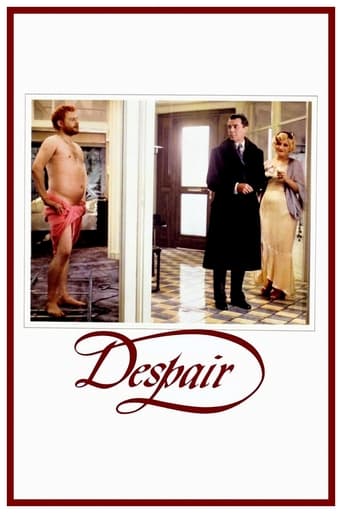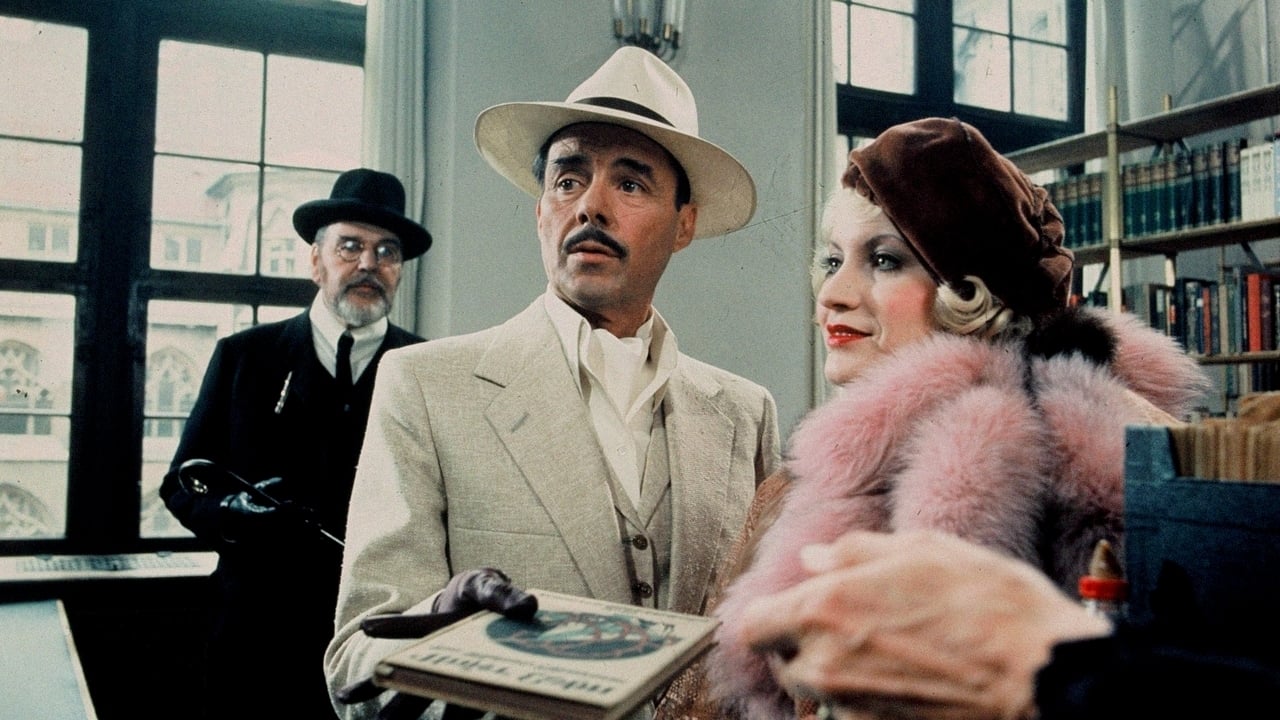hasosch
As the owner of a chocolate factory, Hermann Hermann (Dirk Bogarde) enjoys all the luxury of a high-style bourgeois life, but in reality, it shows up merely as a facade, because his factory stays before bankruptcy, and his wife Lydia (Andréa Ferréol) has a liaison with her brother-in-law, the painter Ardalion (Volker Spengler). Hermann Hermann starts to doubt everything, and eventually he realizes, that this bit of life, that lies still before him, will be wasted in any case to a hopeless struggle against these doubts. His meeting with the sleeping hobo Felix Weber (Klaus Löwitsch) as a picture of the death can be seen as birth of the idea to stage a sudden accident, in order to cash a high sum of insurance money. In exchanging his outer appearance, Hermann Hermann believes to be capable of transcending the borders of his life and to be able to start a new one. Hermann Hermann has a totally emotionless relation to the death, because it is the death of the other and for him a necessary act to commence a new life. The radical moment lies in the fact of the penetration into another life, whose border to one's own life is a big as the border between the Here and the Beyond.The whole movie is characterized by objects and persons, who have their counterparts and mirror images, respectively. For Fassbinder, glass walls were borders, through which one could look through form the one side and which were opaque from the other. While the mirrors in Nabokov's novel stay opaque, Fassbinder creates with his glass labyrinths transparency, allows the sight into the Beyond, and dissolves the hermetic presentation. "Despair" produces a visual bridge between the two worlds: In Fassbinder's film, the borders between the Here and the Beyond start to merge into one another, while Nabokov underlines the closeness of both worlds. Not only is Hermann Hermann himself observing subject, but he is also the object of observation. In view of this perception, the world, in which there is no border anymore between subject and object turns strange and menacing. With the disappearance of the projected Ego also the process of self-dissolution announces itself, that ends with the real Ego being at the end not anymore identical to itself and the dissociation of the personality being complete. But Hermann Hermann's plan fails, because his fatal idea of the similarity between him and Felix Weber is at last the product of his sick fantasy. The hero is becoming the victim of his own deformed perception. Sitting in a hotel room, he finally writes his own story. At the end, the "trip into the light", as the German title of the movie is named, ends with the darkness of Hermann Hermann's mind in a bright Alpine mountain village, when he gets fully insane and considers the reality to be a movie, whose director he is and whose acting he is able to control.There can be no doubt, that this is not only Fassbinder's best movie, but one of the top ten movies made ever. Rating: 10 Points.
m67165
This movie is disturbing. The main character seems to be going a bit crazy. And the political climate of the country looks no better. We know that the war is coming, and will be terrifying. The people in this movie seem to have a strange hunch about all this terrible possibilities just around the corner. They probably feel there's no hope of stopping the process. They decide to get drunk. To enjoy the last days of a dying world. But the guy might not be going totally crazy after all. He has a plan.
wedgwood
This is one classic I was in no mood for at the time of watching it. In the right mood, I suppose even the most boring, confusing and pretentious films can appear lively and spirited.Hermann is a Russian living in Germany with his completely idiotic Russian wife whose only talent is letting him bang her. Whereas even this right isnt exclusive since she is also carrying on with her red-headed bohemian slob of a cousin. Here is the weird part -Hermann keeps seeing himself everywhere, in particular watching he and his wife having sex. He mistakes this for out of body experiences, or split personality and does nothing to help himself out of it, instead entertaining and even encouraging it. Soon he begins to see his own face in other people. He befreinds a tramp who he believes is his look-alike and convinces him to be his body double to create an alibi while he is committing a crime. He dresses him up in his clothes, puts his papers in his pocket and gives him a shave -then he shoots and kills him. Hermann runs away with the understanding he has staged his own death. Obvious to everyone else is that it wasnt him at all, as his passport photo and the dead mans face don't even remotely resemble each other.To be perfectly honest I tuned out of the dialogue after this point and only occasionally glanced at the screen. Despair was not improving, resulting in a complete waste of time. From what I saw it only gets weirder but perhaps with concentration it might begin to fall together. I like bizarre films, and even pretentious ones sometimes. Despair was just too damn over-dramatised or something. I just felt like the guy was digging his own grave and then constantly bitching about it like it was someone elses fault.Yes, the acting was good, but sorry, the characters sucked.
Mo Mo
It's hard for me to stay away from excessive use of superlatives when commenting on what I consider to be Fassbinder's masterpiece. Michael Ballhaus has filmed more than a dozen Fassbinder films, and Despair is a fine example of the value of their collaboration. Several images are stunningly memorable: the water dripping on the eggshells in the sink; the circular tracking shot through the glass walls of Hermann Hermann's office revealing him in his cage; and the auto-voyeurism of Hermann watching himself in bed with his voluptuous, vacant Frau. Doing justice to Nabokov's compelling dialog and canny character studies has been well done before in Kubrick's Lolita, but Tom Stoppard's rendition here was a perfect match for Fassbinder's (and Ballhaus's) visual feast. And if you are somehow not yet a fan of Dirk Bogarde, seeing his performance in Despair will surely make you as ardent an admirer of his work as I have become.


 AD
AD




